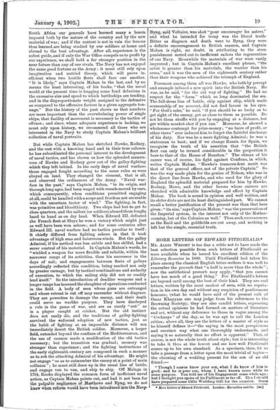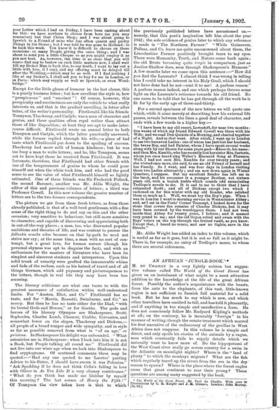MORE LETTERS OF EDWARD FITZGERALD.* MR. ALMS WRIGHT is too
fine a critic not to have made the best selection possible from such letters of FitzGerald as
were available when he issued his excellent edition of the Literary Remains in 1889. Until FitzGerald had taken his place among the classical English letter-writers it was well to remember the proverb that " a half is more than the whole " ; now the antithetical proverb may apply, " that you cannot have too much of a good thing." For FitzGerald's letters are beyond cavil among the best of their kind. They are real letters, written by the most modest of men, with no reputa- tion in his own day and without any suspicion of posthumous honours; (what he would have said of the present cult of Omar Khayyam one may judge from his references to the Browning Society); they are also candid letters, expressing the actual opinions he had formed on matters of literature and art, without any deference to those in vogue among the " Cockneys " of the day, as he was apt to call the London critics; above all, they are the letters of a master of style as be himself defines it—" the saying in the most perspicuous and succinct way what one thoroughly understands, and saying it so naturally that no effort is apparent." That, of course, is not the whole truth about style; but it is interesting to take it thus at the lowest and see how well FitzGerald
comes up to his own standard. As a specimen, then, let us take a passage from a letter upon the most trivial of topics—
the choosing of a wedding present for the son of an old friend:—
"Though I scarce know your eon, what I do know of him is good : and he is your son, whom I have known some while to some purpose. You told me of his Engagement some while ago : but I thought you spoke of its Fulfilment as far off. Eke I should have prepared some little Wedding Gift for the occasion. Since • KM Lottors of Edward FitzGerald. London: Macmillan and Co. Pa.] your Letter which I had on Friday, I have been casting about for this : we have nowhere to choose from here (as you may remember) but that China Shop ; and I was about going to Ipswich to a Friend of mine who has often quaint and pretty Things in his Stores ; but I was told he was gone to Holland : to be back this week. You know it is difficult to choose on these occasions : so many People giving the same thing ; and I was about to send you a little Cheque so as you might employ it as you saw best. As, however, the time is so close that you will scarce find any to bestow on such little matters now, I shall wait till my Broker Man is back (for, to say truth, I want to lay out a little with him, if I can), and my offering must be delayed till after the Wedding,—which may be as well. If I find nothing I like at my Broker's, I shall ask you to buy for me in London, or in Paris : which may supply as well as Ipswich, or even Wood- bridge."
Except for the little gleam of humour in the last clause, this is a purely business letter ; but how excellent the style is, how " perspicuous " and " succinct " ! Of course, however, this perspicuity and succinctness are only the vehicle to what really interests us, and that is the gradual unveiling, in letter after letter, of the writer's personality. FitzGerald, like his friends Tennyson, Thackeray, and Carlyle, was a man of character and genius, and these qualities often repel rather than attract those of like disposition ; at least they are apt to make inter- course difficult. FitzGerald wrote an annual letter to both Tennyson and Carlyle, which the latter punctually answered, while the former replied through his wife,—a piece of bad
taste which FitzGerald put down to the spoiling of success. Thackeray had more milk of human kindness ; but he was
too busy a man to write letters ; and he, like Tennyson, seems not to have kept those he received from FitzGerald. It was fortunate, therefore, that FitzGerald had other friends with less of the temperament of genius to whom he could pour himself out when the whim took him, and who had the good sense to see the value of what FitzGerald himself so lightly estimated. One of these friends was Sir Frederick Pollock, the second Baronet ; another was Mr. Aldis Wright, the editor of this and previous volumes of letters ; a third was Professor Cowell. In this new volume the greater number of letters are to the two former correspondents.
The picture we get from these fresh letters, as from those already published, is that of a well-bred gentleman, with a fine sense of the right thing to do and say on this and the other occasion; very sensitive to behaviour, but still more sensitive to character, and capable of discovering and appreciating both
in out-of-the-way places ; a man, too, who distrusted popular ambitions and theories of life, and was content to pursue the fallentis semita vitae because on that by-path he need not strive nor cry; at the same time, a man with no sort of con- tempt, but a great love, for human nature (though his personal shyness was apt to disguise the fact), and with an
enthusiasm for the masters of literature who have been its simplest and sincerest students and interpreters. Upon this solid trunk of veracity were grafted the innumerable whims and fads of the recluse, such as his hatred of travel and of all things German, which add piquancy and picturesqueness to the letters, though in real life they may have been less amusing.
The literary criticisms are what one turns to with the greatest assurance of satisfaction within well-understood limits. For "Austen, Eliot, and Co." FitzGerald has no taste, and for " Morris, Rossetti, Swinburne, and Co." no mercy. But then he has no taste either for the Iliad, " with its brutal Gods and Heroes," or for Goethe. The gods and heroes of his literary Olympus are Shakespeare, Scott, Sophocles, Charles Lamb, Chaucer, Crabbe, Cervantes, and
somewhat lower on the slopes, Thackeray and Dickens,—
all people of a. broad temper and wide sympathy, and in style as far as possible removed from what is " of an age," or prjcieux. In Shakespeare his delight was unbounded. " What
astonishes me is, Shakespeare : when I look into him it is not a Book, but People talking all round me." FitzGerald did
not live into our wiser age when we look into Shakespeare to find cryptograms. Of scattered comments three may be quoted :—" Had any one quoted to me Laertes' parting Advice to his Sister, I should have sworn it was Polonius."
" Ask Spedding if he does not think Celia's falling in love with Oliver in As You Like It a very clumsy contrivance." " What do you think has made me blubber by myself this morning ? The last scenes of Henry the Fifth ! " Of Tennyson the view taken here is that to which. the previously published letters have accustomed us,— namely, that this poet's inspiration left him about the year 1842 ; the sole evidence of genius later to which any reference is made is " The Northern Farmer." " While Guinevere, Pelleas, and Co. leave me quite unconcerned about them, the Lincolnshire Farmer positively brought tears to my eyes. There were Humanity, Truth, and Nature come back again ; the old Brute becoming quite tragic in comparison, just as Justice Shallow does, seen through Shakespeare's Humour." A few months later we come upon this sentence :—" How did you find the Laureate? I almost think I was wrong in telling him I could take no interest in his Holy Grail, which I should not have done had he not—sent it to me ! A parlous reason." A parlous reason indeed, and one which perhaps throws some light on the Laureate's reticence towards his old friend. No one cares to be told that he has got through all the work he is fit for by the early age of three-and-thirty.
For a second specimen of the new letters we will quote one which, while it aims merely at describing how his external life passes, reveals between the lines a good deal of character, and ends with a few words in a higher key:— "I have been to my old resort, Lowestoft, for near two months : five weeks of which my friend Edward Cowell was there with his Wife: and we read Don Quixote of a Morning, and chatted together of a Night. And so that went. After which, I went up to London to see two bereaved Ladies : one of whom has just lost her husband, the brave Boy, and bad Painter, whom I have spent several weeks along with by our Shores for some years past—Edwards, his name: and then Mrs. Kemble, who has recently lost her sister Mrs. Sartoris, whom you once heard sing Weber's Mermaid Song at Florence. Well. I had not seen Mrs. Kercble for over twenty years; and she wished once more, she said, to see an old Friend of herself and her Family. So I went, and was four 'days in London visiting these two Ladies alternately ; and am now down again in Winter Quarters, I suppose. But my excellent Reader has left me in the lurch, and his successor is a younger Brother, not sixteen years old, with a boyish treble which sounds odd enunciating Trollope's novels to me. It is sad to me to think that I have exhausted Scott ; and all of Dickens except two which I reckoned on for this winter with my old Reader, who relished them as much as I. Well, we must try the Boy's pipe. When I was in London I went to morning service in Westminster Abbey ; and, as"I sat in the Poets' Corner Transept, I looked down for the stone that covers the remains of Charles Dickens, but it may have been covered by the worshippers there. I had not been inside that Abbey for twenty years, I believe; and it seemed very grand to me ; and the old Organ rolled and swain with the Boys' voices on the top through the fretted vault, as you know. Except that, I heard no music, and saw no Sights, save in the Streets."
Mr. Aldis Wright has added an index to this volume, which is useful as far as it goes, but it is not so full as it might be. There is, for example, no entry of Trollope's name, to whom there are several references,







































 Previous page
Previous page